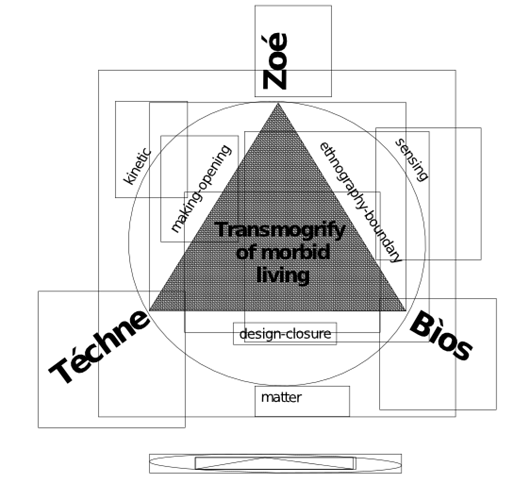The research activity consists in describing the multiverse ways by which the concept of care is re-defined among makers and what makers “make” for opencare in the context of a fablab.
A concept i’m working on is about the “transmogrifying of morbid living” as possibile research of the development on how knowledge of life and knowledge of living are differently generated (Wahlberg, 2014). It is important to understand how and how much opencare practices are represented by makers as a situated practice, at the same time contingent and shared in a different way and by different approach from other healthcare settings.
In the circular triangulation of three important concepts about life, living and technology, bìos, zoé and téchne are hereby considered relationships, identities and actions negotiated in other disciplined and this undisciplined context of care production. Such tension is deeply tacit in the fab lab where experimental practices of design, making and delivering are useful to change (to transmogrify) the concept of care itself.
Check the information about “Transmogrifying morbid living” workshop in Milan at WeMake
LINKS FOR WORKSHOPS ACTIVITIES
Dear participants,
welcome to the hands-on segment of the workshop.
Please, choose and access a category (notes, pictures and sounds) of the field material collected as open resources:
Discuss possibily in group and publish in this thread your comment about one of the three collections.
Changing model of life with disease to disease with life
@Federico_Monaco Thanks so much for all your work. I’m really interested in the data collection and practices you all are doing in regards to how we understand disease. I work as a doctor in the ER, and can tell you from training that we percieve health as the absence of disease. But one thing we have been trying to develop at Woodbine is very similar to the work you are doing. Changing the model of health to think of disease as a part of us, be it our high blood pressure, our cancer, or our depression. And that while treatments can be helpful, we are not striving for a world in which all “disease” is removed from us. In fact, every day our bodies are closer to dying, so we cna never be free from disease. Especially in relation to how we treat the elderly, in the US, they are socially shunned. So how can we reshape the way we understand disease, understand care, and create a world where we are all “living” a beautiful death. I would love to chat more, maybe set up a time for a call to discuss possibilities of creating more collaborative work!
1 Like

